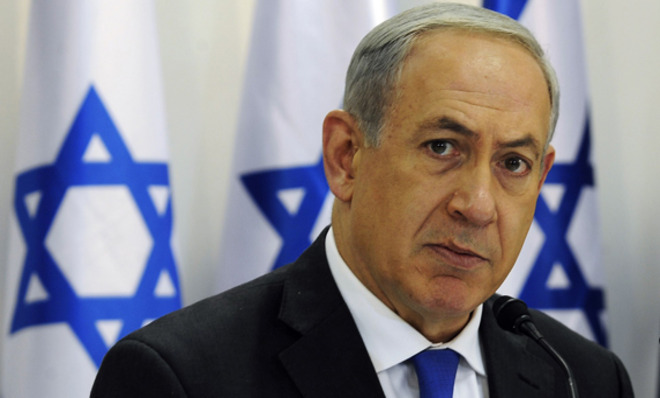Why Netanyahu's endgame in Gaza sounds so far-fetched
Can Israel really demilitarize the Strip without making Hamas a partner?

A free daily email with the biggest news stories of the day – and the best features from TheWeek.com
You are now subscribed
Your newsletter sign-up was successful

Until I heard CNN's weekend interview with Israeli Prime Minister Benjamin Netanyahu and watched Bloody Sunday unfold with scores of Palestinian civilian deaths and 13 Israeli soldiers killed, I thought I had the Gaza thing pretty much figured out. It would end — more or less — the way the two previous movies had concluded.
In both 2008-2009 and 2012, Israel degraded Hamas's high-trajectory weapons; but Hamas survived and restocked its arsenal with weapons of greater range, precision, and lethality. Hamas maintained control over Gaza and even derived a few political benefits in the process. Meanwhile, the people of Gaza continued to suffer — from both Israel's unrelenting economic blockade and Hamas's catastrophic mismanagement and fixation with its armed struggle against Israel. With the advent of Abdel Fattah al-Sisi's government in Cairo, intensified Egyptian pressure on the Muslim Brotherhood also pinched Gazans.
But Netanyahu has now laid out a different vision for an acceptable endgame — the "demilitarization" of Gaza. And the precedent he cited was the U.S.-Russian agreement on removing Syria's chemical weapons, an accord he has praised several times in the past.
The Week
Escape your echo chamber. Get the facts behind the news, plus analysis from multiple perspectives.

Sign up for The Week's Free Newsletters
From our morning news briefing to a weekly Good News Newsletter, get the best of The Week delivered directly to your inbox.
From our morning news briefing to a weekly Good News Newsletter, get the best of The Week delivered directly to your inbox.
This is a big statement for a risk-averse Israeli prime minister who rarely lays out big visions when it comes to matters of war and peace.
Is he serious? Is a demilitarized Gaza really possible? And would such a solution actually provide for more than just a temporary respite between confrontations?
(More from Foreign Policy: The last great myth about Egypt)
Let's be clear: "Demilitarization," as Netanyahu means it, is on the far end of the outcome spectrum. This would mean a cessation of hostilities far different than in previous rounds of fighting. It would require a fundamental change in Gaza's political situation brought about either by military or diplomatic means. Given the loss of 13 Israeli soldiers on Sunday, July 20, in a single incident, it's hard to imagine that Netanyahu is prepared to do this through force of arms — an undertaking that would require the reoccupation of the Gaza Strip for a prolonged period and the extirpation of Hamas's military and political wings. Indeed, the number of casualties on the Israeli and Palestinian sides would likely make the costs unacceptable.
A free daily email with the biggest news stories of the day – and the best features from TheWeek.com
It would also require someone to assume real responsibility for Gaza. A transformed and defanged Hamas is hard to imagine. But if Israel forcibly tried to dismantle Hamas as an organization, there would likely be massive casualties on both sides. And in these circumstances neither Egypt, let alone the Palestinian Authority, could ride into Gaza on the backs of Israeli tanks amid the carnage.

Demilitarization is impossible without a diplomatic solution by which Hamas agrees to give up its weapons in exchange for a fundamental change in the economic and political conditions in Gaza, perhaps a kind of mini Marshall Plan. Several Israelis, including former Defense Minister Shaul Mofaz and Michael Oren, the former Israeli ambassador to the United States, have presented variations of this concept. The model, coincidentally, is the U.S.-Russian deal to remove Syrian President Bashar al-Assad's store of chemical weapons. In its most robust form, such a deal would see Egypt, the United States, and the Palestinian Authority — backed up by the international community — broker a deal between Hamas and Israel. Mofaz proposes a $50 billion fund to support economic development in Gaza.
(More from Foreign Policy: The Israeli-Palestinian conflict, as seen through Tinder)
Meanwhile back on Planet Earth.…
Of course, none of this seems even remotely possible. Hamas would have to abandon its 35-year reason for being, give up armed struggle, accept Palestinian Authority rule, and become a political party without achieving the end of Israel's occupation, let alone statehood. Someone would also have to supervise the area close to the Israel-Gaza border inside the Strip in order to ensure that Hamas didn't continue to tunnel. An acceptable international force would have to be organized to identify, collect, and destroy Hamas's weapons. All other smaller resistance groups, including Islamic Jihad and the Popular Resistance Committees, would need to be defanged. Israel (at least temporarily) would need to accept the reality of Palestinian unity government during the transition, and the international community — in an uncharacteristic display of focus and commitment — would need to step up with tons of money and technical assistance. In other words, forget it.
In the 1990s, when there actually was a real peace process rather than the Kabuki theater that passes for one today, I'm not sure even this kind of resolve was possible. I wish I had a dollar for every time some well-intentioned soul approached me with some new Marshall Plan for Gaza or the Middle East.
Perhaps the best we can hope for would be a clean cease-fire deal brokered by the Egyptians that, once accepted, might begin to provide some economic benefits for Gaza: perhaps with Qatar paying the salaries of 43,000 Hamas employees, Cairo doing more to regularize the crossing at Rafah, and the Israelis allowing more imports in and exports out of Gaza. The International Crisis Group laid out something very close to this in its most recent report.
(More from Foreign Policy: First Gaza, then the West Bank)
Hamas, however, has more-ambitious demands for a fundamental change in Gaza's economic situation that it wants to take credit for delivering, including a Gaza port and airport. Long-suffering Gazans deserve this, and more. But the cruel realities of Middle Eastern politics will likely conspire to ensure they don't get it. Egypt isn't going to help facilitate a miracle on the Mediterranean when 40 percent of its own people live on less than $2 a day.
Some Israelis like the idea of two Palestinian statelets rather than one because it would preclude a negotiated two-state solution. But no Israeli government can reward and strengthen Hamas with these goodies when Hamas continues to call for Israel's destruction and arm itself for the next round. And Hamas's own willingness to preserve itself and its resistance ideology at the expense of Gaza's economic development, as well as its endless calls to fight the Israelis to the last Gazan civilian, doesn't exactly create a reality where it's a partner for good governance and development.
When it comes to Gaza, don't dream about demilitarization or economic miracles. In fact, forget the endgame. Right now, summoning the urgency, the right mediator, and a deal to stop the killing will be hard enough.
-
 Is Andrew’s arrest the end for the monarchy?
Is Andrew’s arrest the end for the monarchy?Today's Big Question The King has distanced the Royal Family from his disgraced brother but a ‘fit of revolutionary disgust’ could still wipe them out
-
 Quiz of The Week: 14 – 20 February
Quiz of The Week: 14 – 20 FebruaryQuiz Have you been paying attention to The Week’s news?
-
 The Week Unwrapped: Do the Freemasons have too much sway in the police force?
The Week Unwrapped: Do the Freemasons have too much sway in the police force?Podcast Plus, what does the growing popularity of prediction markets mean for the future? And why are UK film and TV workers struggling?
-
 'Once the best in the Middle East,' Beirut hospital pleads for fuel as it faces shutdown
'Once the best in the Middle East,' Beirut hospital pleads for fuel as it faces shutdownSpeed Read
-
 Israeli airstrikes kill senior Hamas figures
Israeli airstrikes kill senior Hamas figuresSpeed Read
-
 An anti-vax conspiracy theory is apparently making anti-maskers consider masking up, social distancing
An anti-vax conspiracy theory is apparently making anti-maskers consider masking up, social distancingSpeed Read
-
 Fighting between Israel and Hamas intensifies, with dozens dead
Fighting between Israel and Hamas intensifies, with dozens deadSpeed Read
-
 United States shares 'serious concerns' with Israel over planned evictions
United States shares 'serious concerns' with Israel over planned evictionsSpeed Read
-
 Police raid in Rio de Janeiro favela leaves at least 25 dead
Police raid in Rio de Janeiro favela leaves at least 25 deadSpeed Read
-
 Derek Chauvin's attorney files motion for new trial
Derek Chauvin's attorney files motion for new trialSpeed Read
-
 At least 20 dead after Mexico City commuter train splits in overpass collapse
At least 20 dead after Mexico City commuter train splits in overpass collapseSpeed Read